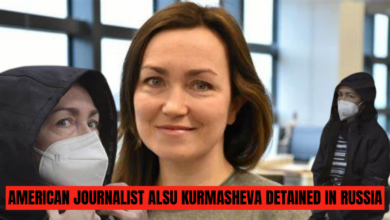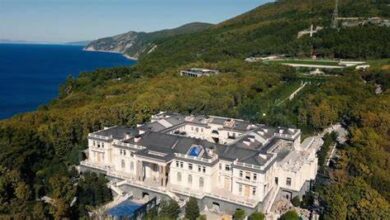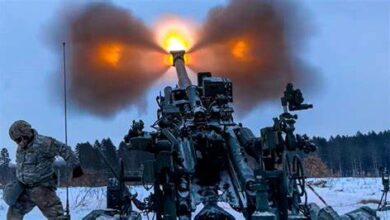Anti-Jewish riots in Dagestan demonstrate Putin’s Hamas balancing act’s hazards.
"Dagestan's anti-Semitic violence highlights the risks of Putin's delicate handling of Hamas."
Anti-Jewish riots :Vladimir Putin, the president of Russia, is proud to lead a country that is inclusive and diverse, with people of many racial and religious backgrounds living together. In many ways, Dagestan reflects this diversity; its hilly topography, which is home to over 30 different ethnic groups, each with their own language, serves as an exemplary example.
The images of anti-Semitic protestors occupying Makhachkala Uytash Airport in Dagestan have caused great distress to the Jewish community in Russia, drawn international censure, and raised serious questions about the consequences of Putin’s military operation in Ukraine, which he now perceives as being closely linked to the Gaza crisis.
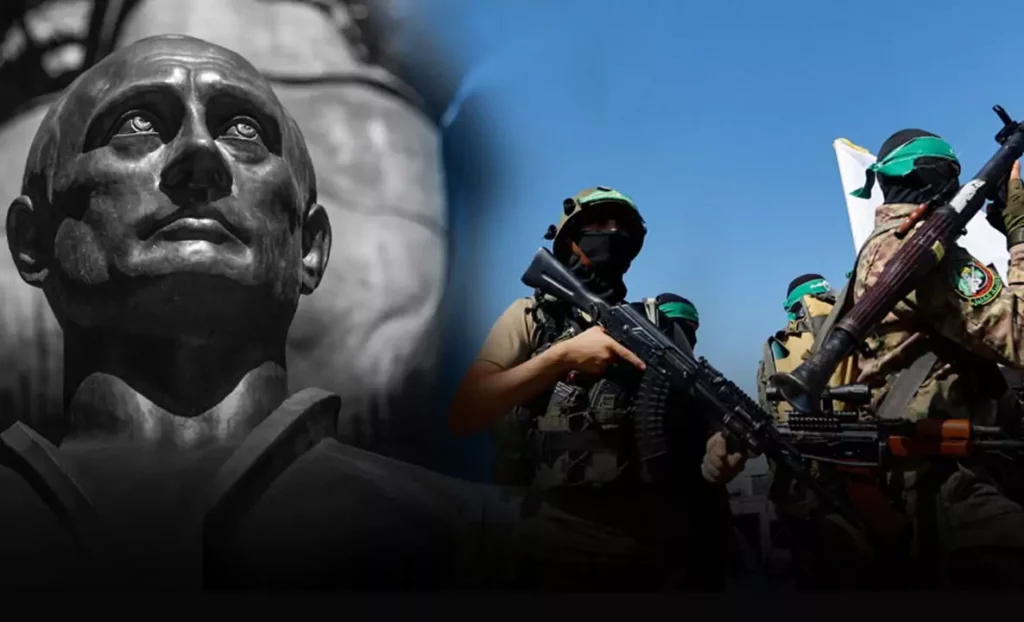
The head of the Kremlin called a comprehensive meeting on Monday to discuss the Dagestan issue. There were rumors that people of Jewish and Israeli descent were on a Red Wings Airlines flight that arrived from Tel Aviv on Sunday, which set off this disturbance. Protesters then broke into the airport terminal and pushed their way onto the runway.
People at the airport held signs that said things such, “Dagestan has no room for those who harm children,” and “We oppose Jewish refugees.”
“The people who have gathered are against the Palestinian-Israeli conflict,” according to the Russian state news agency TASS.
It was stated by officials that at least twenty people were injured, and sixty people were detained. The incident was likened to a pogrom, according to State Department Spokesperson Matthew Miller.
In reaction to the announcement, the Ministry of Foreign Affairs and the office of the Israeli Prime Minister jointly released a statement on Sunday. They said they hoped Russian law enforcement would protect Israeli citizens and Jews around the world. They also demanded that individuals promoting violence and hatred towards Jews and Israelis face harsh consequences.
Putin urged law enforcement to act swiftly, firmly, and accurately in his remarks on Monday in order to protect Russia’s constitutional order, individuals’ rights and freedoms, and interethnic and interreligious peace. On the other hand, the head of the Kremlin turned the blame off Russia.
“The events in Makhachkala last night were inspired through social networks,” Putin stated, insinuating that Ukraine and “the hands of Western intelligence agencies” had exploited emotions running high inside Dagestan over Israel’s relentless military campaign against Hamas in Gaza and rising civilian casualties.
We can only help Palestine in the fight against those who are behind this tragedy,” Putin said, adding, “we, Russia, are fighting them within the framework of the Special Military Operation,” the official euphemism for Russia’s ongoing war in Ukraine.
These remarks demand careful consideration.
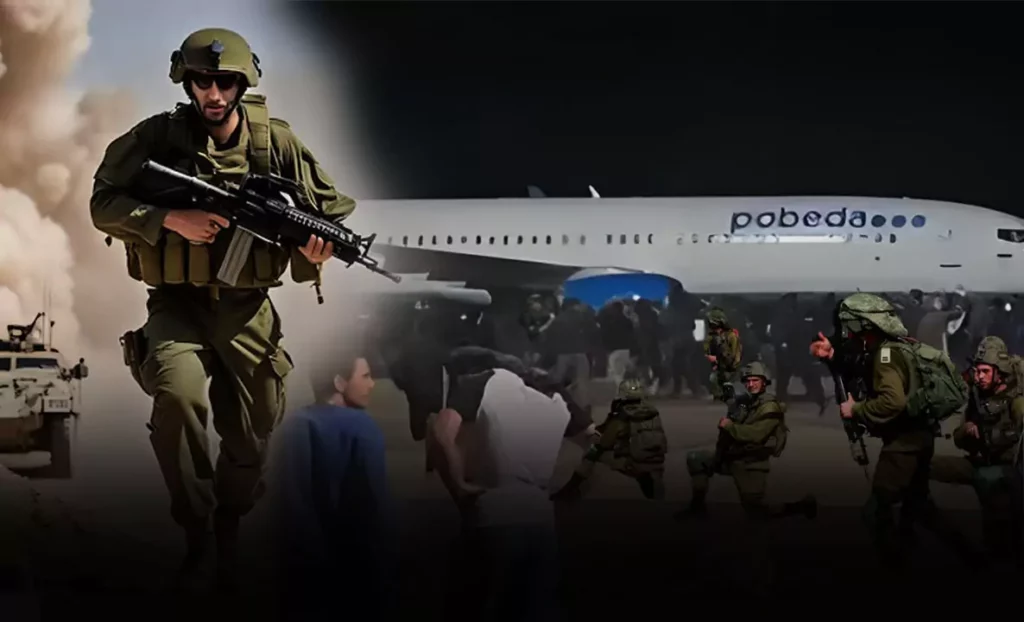
Putin has been deftly maintaining a precarious international balancing act since the Hamas assaults on October 7, casting himself as a possible mediator and advising patience on both sides. Hamas has expressed admiration for this position.
Furthermore, Putin expressed his most pointed condemnation of Israel to date in his statements on Monday, calling the events in the Gaza Strip “horrifying” and unjustifiable. Additionally, he said that looking at pictures of “bloodied, deceased children” caused people to tighten their fists and cry.
A tense region of Russia
Pictures like this undoubtedly infuriated the people of Dagestan, a mostly Muslim country that has historically accepted a variety of Islamic religions.
Even though Judaism has a long history in the area and is primarily practiced by the Mountain Jews, who speak a dialect of Persian, Dagestan is home to a very small Jewish community. Over the centuries, emigration has caused the population to significantly decline, despite coexisting with their Muslim neighbors.
However, Israel is becoming concerned due to Putin’s recent attempts to resolve the Gaza conflict. Israel’s Ministry of Foreign Affairs called the Russian ambassador to Jerusalem on Sunday, according to a news release, to express its disapproval of a Hamas delegation’s visit to Moscow the previous week.
Putin is nevertheless appealing to a variety of audiences. Russia maintains complex ties throughout the Middle East: Putin backs Syrian President Bashar al-Assad, whom Israel views as an enemy. In order to obtain drones to employ against Ukraine, Putin also depends on Iran, another enemy of Israel. Putin concurrently keeps cordial ties with Mohammed bin Salman, the crown prince of Saudi Arabia, a prominent figure in the area.
While his relationship with Israeli Prime Minister Benjamin Netanyahu has cooled, he has continued to have cordial business contacts with his Israeli peers.
However, these localized processes mask a bigger picture. Putin has presented himself as fighting the US and the West in an existential conflict, with Ukraine serving as the main front. His discourse, directed at “those who are behind this tragedy,” now appears to establish a clear link between Gaza and Ukraine.
Putin stated on Monday that “the United States desires ongoing turmoil in the Middle East to undermine the countries that are pushing for an immediate ceasefire in the Gaza Strip.” He accused the US of instigating the crisis.
John Kirby, the National Security Council’s Coordinator for Strategic Communications, said, “We haven’t received any response from the Kremlin” in reference to Moscow’s claims about the airport incident.
“Nothing, no condemnation, no calling for the stoppage of hate, discrimination and bigotry,” Kirby said, adding, “It’s classic Russian rhetoric that when something goes like bad in your country … blame somebody else, blame it on outside influences.”
According to Volodymyr Zelensky, the president of Ukraine, the Dagestan riot shows that Russia is “losing its grip.”
Numerous analysts have noted that Putin doesn’t seem genuinely concerned about civilian deaths in Gaza. His forces are fighting a bloody war in Ukraine, destroying cities and infrastructure used by civilians. In addition, the International Criminal Court (ICC) has issued an arrest warrant for the Russian president as a result of his country’s actions during the conflict.
Putin, however, is depending on a tactic that has already proven successful: while waging a conquest war in Ukraine, Moscow’s diplomats are aggressively pushing a global public relations campaign that presents Russia as a resolute anti-colonial power, garnering support in the Global South.
Anti-Israel rhetoric
The same narrative has been reinforced domestically by Russian official media. Some Russian politicians and commentators on state TV have been more critical of Israel since the Hamas attacks on October 7. This serves to deflect attention away from Ukraine in the midst of the Gaza war on a convenient level.
Ukrainian Foreign Ministry spokesperson Oleh Nikolenko accused Moscow of trying to shift responsibility. “Threats to exterminate the Jews are the result of the work of Russian state propaganda, which for decades cultivated feelings of hatred towards other peoples among Russians,” he noted.
The rhetoric against Israel can, however, quickly go off course, as the unrest in Dagestan makes clear.
Ramzan Kadyrov, the pro-Kremlin leader in charge of the Chechen region of neighboring Russia, strongly backed Palestine earlier this month and proposed the notion of sending his “peacekeeping” forces to assist in resolving the war between Israel and Hamas. Despite Kadyrov’s appalling human rights record, this may seem unlikely, yet for almost twenty years, he has helped Vladimir Putin uphold an unforgiving and unstable peace in Russia’s northern Caucasus region, which includes Dagestan. Furthermore, Kadyrov has provided military support for Russia’s engagement in the crisis in Ukraine.
Since the Russian government’s conscription orders caused riots in the province last year, maintaining stability in Dagestan is presumably a top priority for the Kremlin. Ethnic minorities were unfairly being drafted, according to some campaigners, to serve in Ukraine. Tension is further exacerbated by the current battle in Gaza. Harold Chambers of the independent website Riddle Russia, which closely monitors Russia, provided a shrewd analysis of what happened on Sunday, pointing out that the ongoing conflict in Ukraine and Dagestan’s dire economic circumstances are contributing to the escalation of local discontent.
“The attempted pogrom is not just rooted in antisemitic messaging, but in systemic dynamics in the region,” he wrote.
General socioeconomic conditions in the republic continue to deteriorate. Basic necessities to live such as electricity, water, and gas are irregularly supplied, which led to sustained small protests only a few months ago. Additionally, Russia’s war in Ukraine has impacted Dagestan heavily, with significant casualties. Public appeals and small actions do not regularly succeed, with the authorities sweeping them aside.”
Yevgenia Albats, a Russian investigative journalist, delivered her critique with an equal degree of acerbity.
“Are there anti-Semites in Makhachkala?” she wrote on X. “Yes, sure. Have they been there before? Yes, sure. What has happened now? 20 months of war, rising prices, hundreds, if not thousands of men killed, the pressure is accumulating and requires a release.”
She said that Russia’s disinformation effort is a useful instrument, painting a picture for the Middle East, Iran, and the Global South that suggests Russia supports these regions, with Putin leading the charge as the leader of the anti-American world.
Putin has been pursuing a dangerous geopolitical game for a number of months, counting on the West’s mistrust to support his activities in Ukraine. But as one violent episode against the Jewish community in Dagestan, in the south, demonstrates, this strategy can backfire very quickly, especially for individuals who become entangled in the propaganda of the Russian state.
READ MORE :
- Russian Oligarchs Amidst Sanction in London In-depth Investigation
- Wives and Daughters of Russian Oligarchs Sanctions to Protect Wealth
- Orlando Steel Company Owner Convicted for Illicit $150 Million Payment to Russian Oligarch
- Brad Pitt Gains the Upper Hand in the Malicious Chateau Miraval Winery Lawsuit

